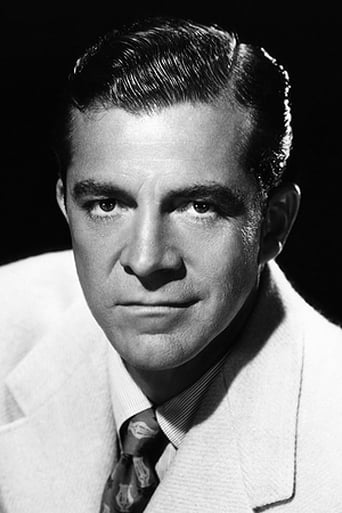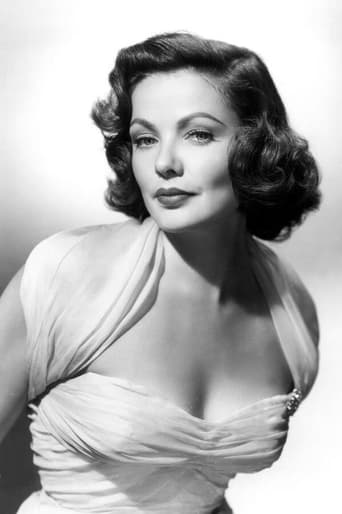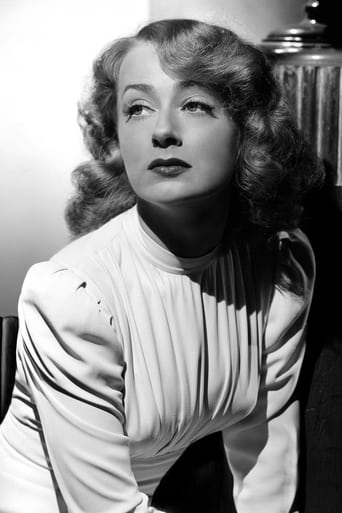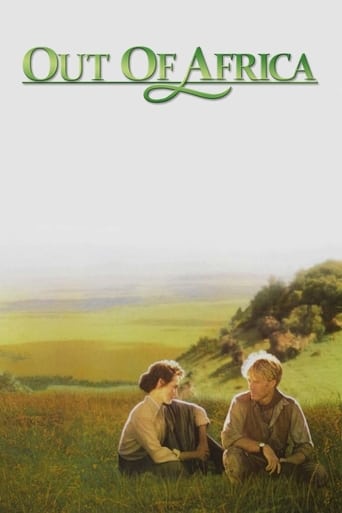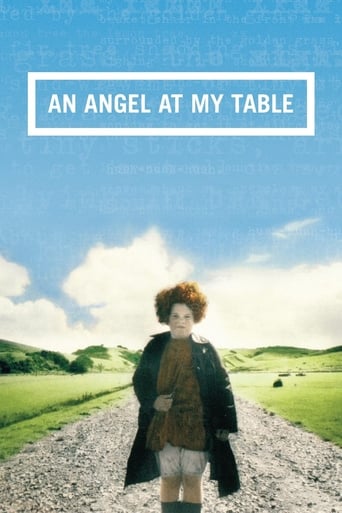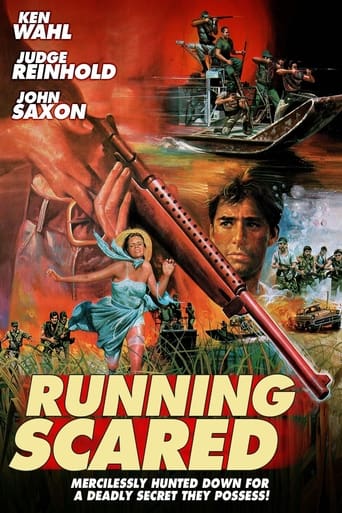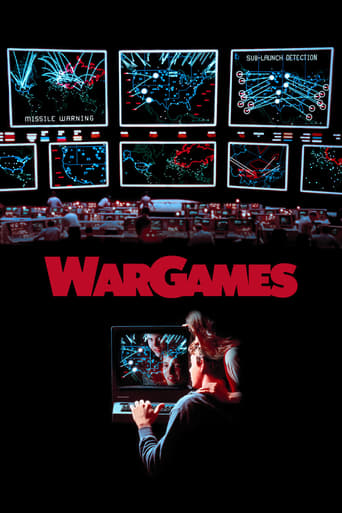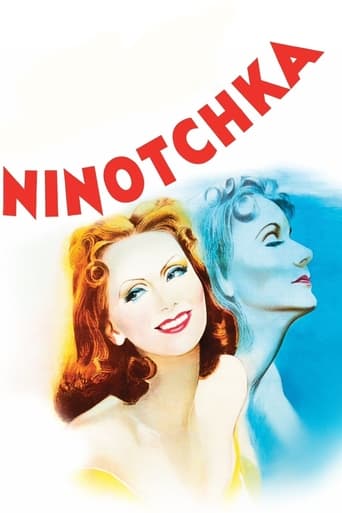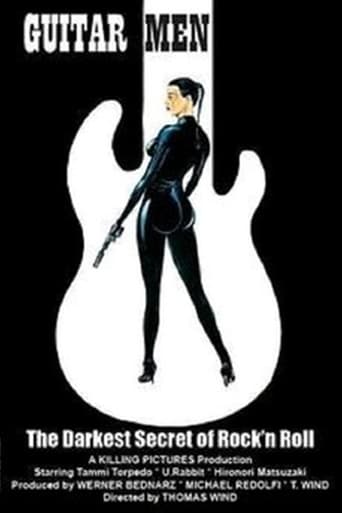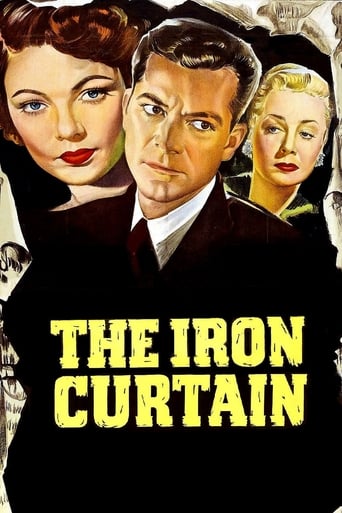
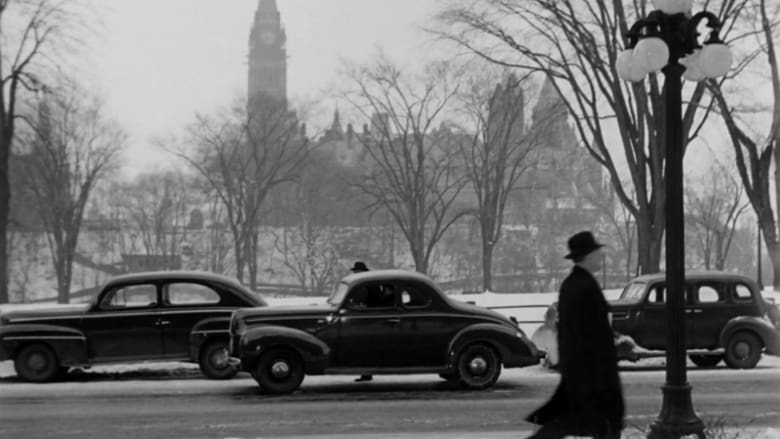
The Iron Curtain (1948)
The Iron Curtain is based on the actual 1945 case of Soviet cipher clerk Igor Gouzenko, (Dana Andrews), who, after careful training, was assigned to the U.S.S.R. Embassy in Ottawa, Canada in the midst of World War II. Eventually, Gouzenko defected with 109 pages of material implicating several high level Canadian officials, outlined the steps taken to secure information about the the details of the nuclear bomb via numerous sleeper cells established throughout North America. The scandal that resulted when details of this case were publicized by American columnist Drew Pearson in early 1946 involved Canada, Britain and the United States.
Watch Trailer
Cast


Similar titles
Reviews
Good concept, poorly executed.
Simple and well acted, it has tension enough to knot the stomach.
This is a must-see and one of the best documentaries - and films - of this year.
It's easily one of the freshest, sharpest and most enjoyable films of this year.
In reviewing this movie, I have to admit my personal bias as a Canadian living in Ottawa where the movie was shot. I had seen it many years ago and liked it so I was excited when it was shown on TCM on Easter eve. I had forgotten many of the scenes, although I know the story well. I appreciated the crisp cutaway shots of Ottawa with Gothic public buildings and brick houses shown against the stark winter backgrounds. I also liked the way the movie was shot in darkness and shadows evoking the Cold War atmosphere. Director Wm. Wellman got the details correct with his script and the visual references to Ottawa landmarks. The Justice Building is the actual Confederation Building still used by the Dept.of Justice. The railway shown running along the Rideau Canal is no longer there but that was the location used by trains in and out of Union Station in downtown Ottawa. The actual apartment where Gouzenko lived is shown. It still stands along with the park across the street where there is signage indicating the historical significance of the site nearby. We also see Somerset St. with a streetcar passing the building where he resided. The Parliament Buildings, the Château Laurier and the National Research Council are all shown and all were pivotal locations for the story. There is a reference to the child of Igor and Anna Gouzenko born at St. Vincent's Hospital, which still stands in the neighbourhood where Gouzenko lived. I like the documentary style also used effectively in other films from that era, such as The House on 92nd Street, Naked City and the Wrong Man. The film noir look is typical of the era and suits the espionage story. Where the movie falls short, however, is in the characters of Igor and Anna Gouzenko as performed by Dana Andrews and Jean Tierney. I can certainly respect the choice of two accomplished actors for the roles; however, these Hollywood icons are a stretch for the Russian couple in the story, especially for a movie that pays such close attention to other details. Nevertheless, I can see that two acting stars would attract attention to the movie and the story. For example, a Cold War museum outside Ottawa, built as a bunker for government leaders in the 1950's, features photos from the movie to highlight the story. As someone with a passion for Canadian history and movies, I have great affection for The Iron Curtain. I was very grateful for TCM bringing this little known movie to its viewers.
Who doesn't love a good piece of anti-Communist propaganda? Admittedly, 'The Iron Curtain (1948)' is a rather average example of the art-form {with Sam Fuller's 'Pickup on South Street (1953)' being the best} but at least Wellman's film is given a boost by the winning combination of Dana Andrews and Gene Tierney the latter of whom being the main reason that I watched this film. Another reason to watch 'The Iron Curtain' is its magnificent soundtrack, plundered from the repertoires of Russian composers Dmitri Shostakovich, Sergei Prokofiev, Aram Khachaturyan and Dominik Miskovský (each of whom ran into political turmoil back home for their perceived collaboration on a Hollywood picture). The music is unique to 1940s cinema, suggesting a grandeur that, back then, could only be found in the cinematic scores of Hungarian-born Miklós Rózsa. This sense of grandness is crippled somewhat by the film's documentary-like approach.'The Iron Curtain' was based on the true story of Igor Gouzenko, a Russian cipher clerk living in Canada with his wife and child. When Gouzenko defected in 1945, he exposed Stalin's efforts to steal the Allies' nuclear secrets, even while WWII was still raging. Like most Cold War films, this one starts off a little slow, utilising plenty of furtive glances and lengthy silences, but the suspense really kicks in when Gouzenko steals classified Soviet documents and tries to find somebody who'll take them. Dana Andrews, one of the most underrated leading man of the 1940s, brings a tired determination to the film's final gripping moments, as he pleads with a Canadian Mountie to protect him. Gene Tierney, looking as lovely as ever, is still denied the emotional depth of her role in 'Laura (1944)' {in which she and Andrews had previously starred}, but otherwise performs well.
The defection of Igor Gouzenko from the Soviet Embassy in Ottawa, Canada, in 1946, was one of the most electrifying events of the Cold War. The documents and information which he brought with him, gained from his work as a top-secret cipher clerk, resulted in the destruction of the main Soviet spy ring in Canada, which included a Member of Parliament and a nuclear scientist who was working on the atomic bomb. This film, with all the locations shot in Ottawa, and its details drawn from the official reports of a Royal Commission, is a fascinating depiction of the true story of Gouzenko from the moment of his arrival in Canada, his first time outside the Soviet Union, till his defection with his wife and child. William Wellmann directed the film in a low-key style, with some documentary linking narration from time to time. Dana Andrews was never so subdued and soft-spoken as Gouzenko in this film, and Gene Tierney is remarkably self-effacing as the devoted wife and mother of an infant. She has no particularly interesting scenes. The really powerful performances in this film are by Berry Kroeger, in his first film appearance, as an insidious, swaggering and menacing mastermind of a Soviet espionage ring, and Eduard Franz as a Soviet major who 'just cannot take it any more' and turns into a drunk. The film is tense and gripping, and follows closely the real life events of this notorious story. June Havoc is effective in a minor role as the resident Soviet honeypot who tests the new staff with alcohol and seduction to see if they are indiscreet. The world inside the Soviet Embassy is convincingly and eerily depicted, a demi-monde and a half-life of people serving Stalin and the Party like grim automatons with dark faces and all humanity stripped out of them. This film gives a nice lesson in the realities of sordid power, and the hollowness of institutionalised betrayal. There are none so low as those who slither.
This little cold war story tells the tale of an ordinary man caught up in the intrigue of the atomic spy scandal of the 1940's in Canada. Working as a code clerk in the Soviet embassy in Canada Igor Gouzenko learns that atomic secrets are being forwarded to Stalin through his office. The problem for the Soviet Union is that while in Canada Gouzenko begins to realize that the government he works for and fought for is more of a threat to its people than a protector. He also realizes that the Canadians around him are decent people and no threat to his people. Then the action begins, he steals copies of the information being stolen and tries to go to the Canadian Government and press and gets nowhere. Finally, when the NKVD police from the embassy show up at his apartment and they cause such a ruckus the neighbors call the local Canadian Police the nature of the documents are revealed. One of those immortal lines is uttered by the Cop when told the papers are property of the Soviet Union;"All Stolen Property must be Identified at the Police Station". This is followed by a look by the Cop equivilent to "Go ahead,Make my day". Some might try to say this film is an anachronism and too "hawkish" but the facts are true and the fall of the Soviet Union has backed it up. The acting is by a group of "journeymen and women",the direction is as simple as that of "The Longest Day",to tell an incredible tale that no fiction writer could dream up.


